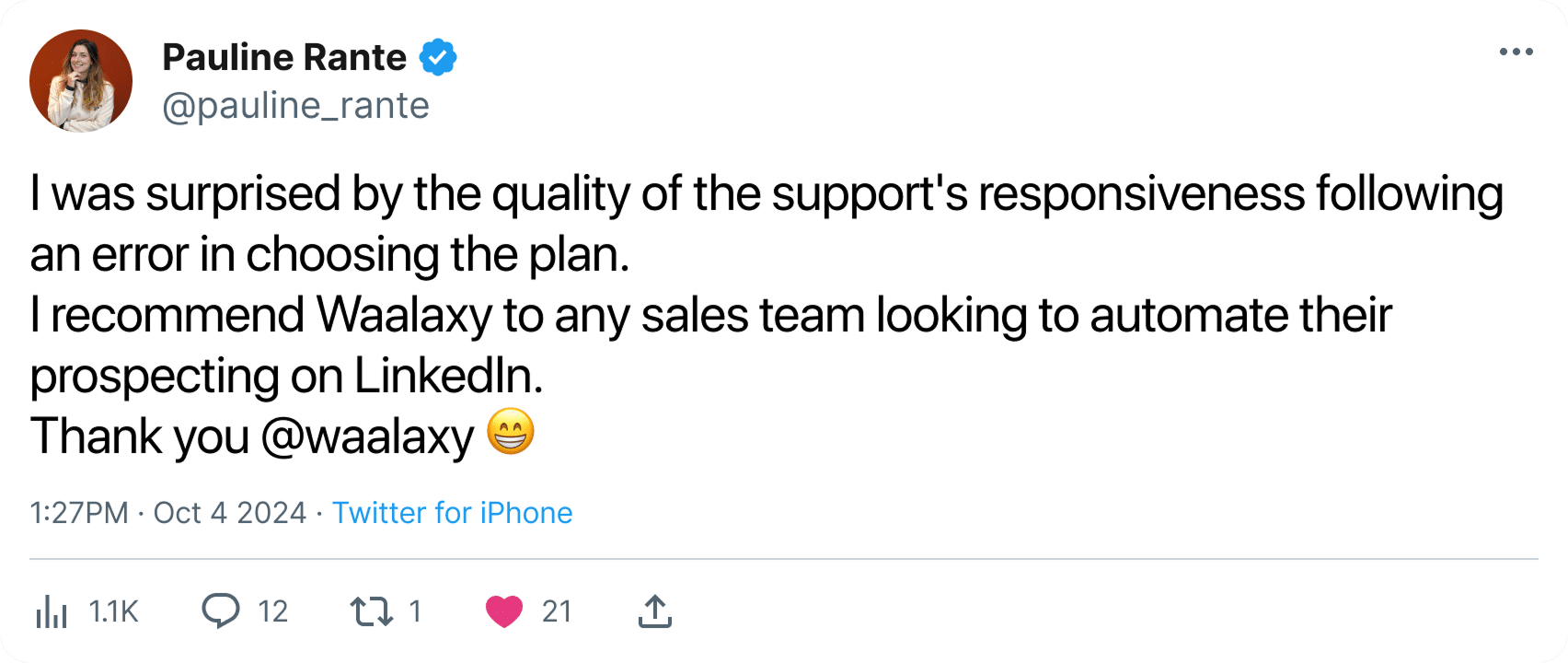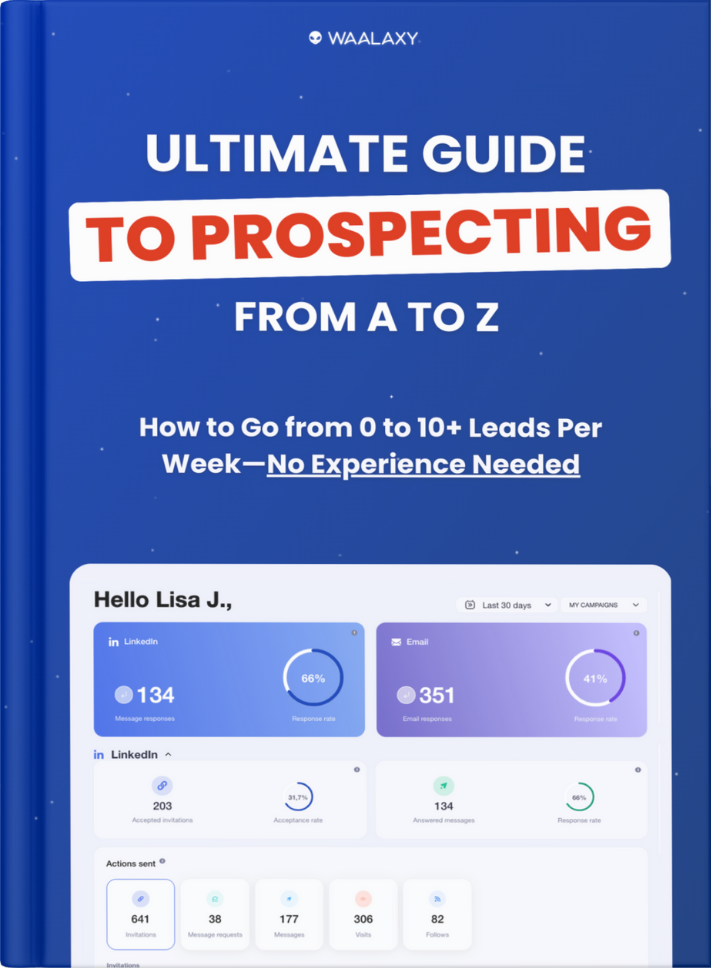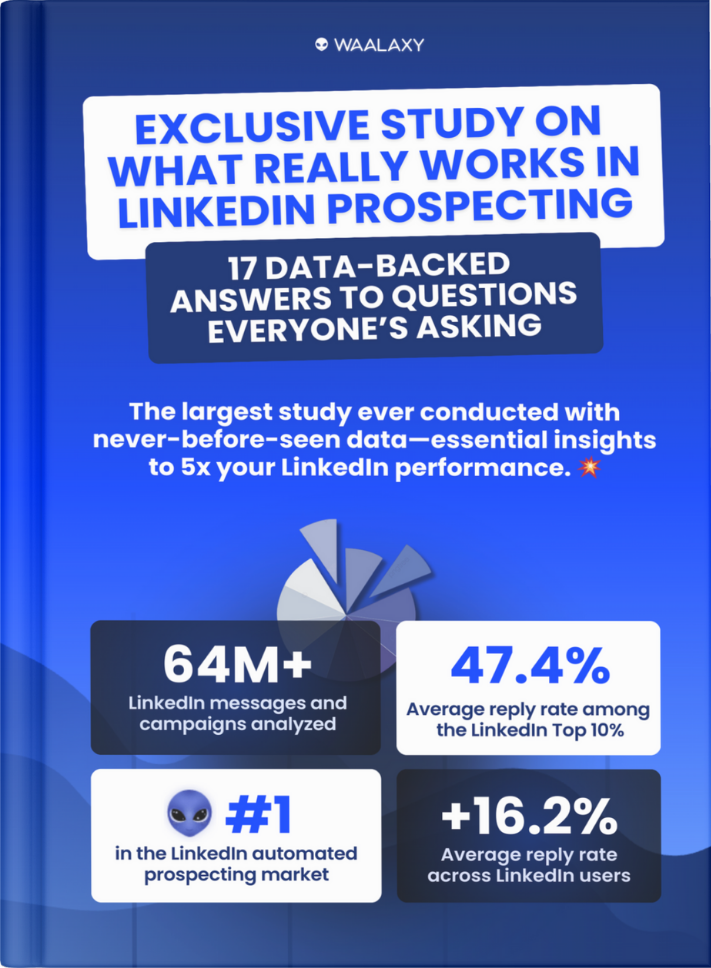Sales techniques ? It’s like a toolbox full of strategies and methods for convincing customers to buy what you have to offer.🛠️ What’s the objective behind it all? Simple: make the cash register ring, of course! But, wait, there’s more to it than that.
🤝 These techniques are not just about filling the coffers, but also about building strong relationships with your prospect, meeting their needs effectively and creating value for them. By adopting these sales strategies, you’ll succeed in influencing your customers’ decision-making process and keeping them loyal.
Whether you’re a beginner, curious or a professional, get ready to discover all the methods to boost your sales ! 💼
Today, we’re going to explore 10 must-have sales techniques ! 🚀
10 Proven Sales Techniques to Elevate Your Sales Strategy
Navigating the competitive landscape of the market requires a dynamic approach to sales. Here are ten sales techniques that can help any salesperson improve their approach and achieve remarkable results using strategic selling technique and effective sales methods. 🛍️
1. Leverage Social Proof
Social proof is a potent sales method that capitalizes on human psychology to influence buyer decisions 🧠. It’s based on the idea that people are more likely to engage in behaviors if they perceive these actions as typical or approved by others. This approach can be particularly effective in sales as it helps to mitigate the perceived risk in the buyer’s mind and builds credibility for your product or service 💼.
Why Social Proof Works
Humans naturally look to others for cues on how to think, feel, and act, especially in situations where they are uncertain 🤔. In the context of sales, showcasing how others have benefited from a product or service can reassure potential buyers that they are making a wise choice. It subtly conveys that a decision to purchase has been the right call for many others, suggesting it will be for them as well.
Types of Social Proof
- Testimonials 💬
- Case Studies 📚
- User Reviews and Ratings ⭐
- User Numbers 📈
- Celebrity or Expert Endorsements 🌟
How to Strategically Incorporate Social Proof :
🌐 On the website : Make sure that testimonials and partner logos are prominently displayed on key pages such as the home, product and checkout pages. This builds trust and can positively influence purchasing decisions.
📩 In Marketing Materials : Incorporate customer quotes and case study extracts into your brochures, emails, and presentations. This enriches your messages and increases their credibility.
📲 On Social Media : Regularly share customer reviews and case studies on your social channels. This effectively spreads positive word-of-mouth and rapidly expands your reach. You can also implement an influencer marketing strategy. These ambassadors can add credibility to your offers.
2. Use Value-Based Selling Techniques
Value-based cross selling focuses on demonstrating the specific value a product or service provides to customers 🎯. This sales method requires a deep understanding of the customer’s needs, challenges, and goals, ensuring the product aligns with their priorities for more effective sales interactions 🤝.
➡️ Understanding Customer Needs :
- Industry Insight : Learn about the customer’s industry, including challenges and trends 📈.
- Business Goals : Identify the customer’s short and long-term objectives 🎯.
- Pain Points : Recognize specific challenges the customer faces 😣.
➡️ Translating Features into Benefits :
- Feature Identification : Define key features of your product, especially those that stand out against competitors 🌟.
- Benefit Linkage : Connect each feature to how it can improve the customer’s operations (e.g., increasing productivity or reducing costs) 💡.
- Quantifying Value : Attach numerical benefits to features, like a 20% increase in productivity 📊.
➡️ Tailoring Your Pitch :
- Personalized Presentations : Customize sales presentations to address the propspect’s unique situation 🎨.
- Use Case Examples : Provide case studies demonstrating how similar customers benefited from your product 📚.
- ROI Calculations : Include ROI analyses to project financial benefits 💸.
Don’t know how to calculate it ? Find out how to calculate your return on investment (ROI) !
➡️ Engaging with Decision-Makers :
- Identify Stakeholders : Determine key decision-makers and their priorities 🔍.
- Address Interests : Customize communication to meet the concerns of each stakeholder 👥.
- Consensus Building : Foster agreement among stakeholders by highlighting the overall benefits to the organization 👍.
➡️ Continuous Feedback and Improvement :
- Follow-Up : Regularly check in with customers post-sale to assess the product’s impact 🔁.
- Adjustments and Enhancements : Adapt the product to meet evolving customer needs 🔧.
- Case Development : Document successes to refine future value propositions 📝.
3. Employ the SPIN Selling Technique
SPIN Selling is a consultative sales method that guides you to ask the right questions at the right time. This technique helps uncover the customer’s underlying problems and then clearly demonstrates how your product can solve these specific issues, leading to more persuasive sales conversations.🌀
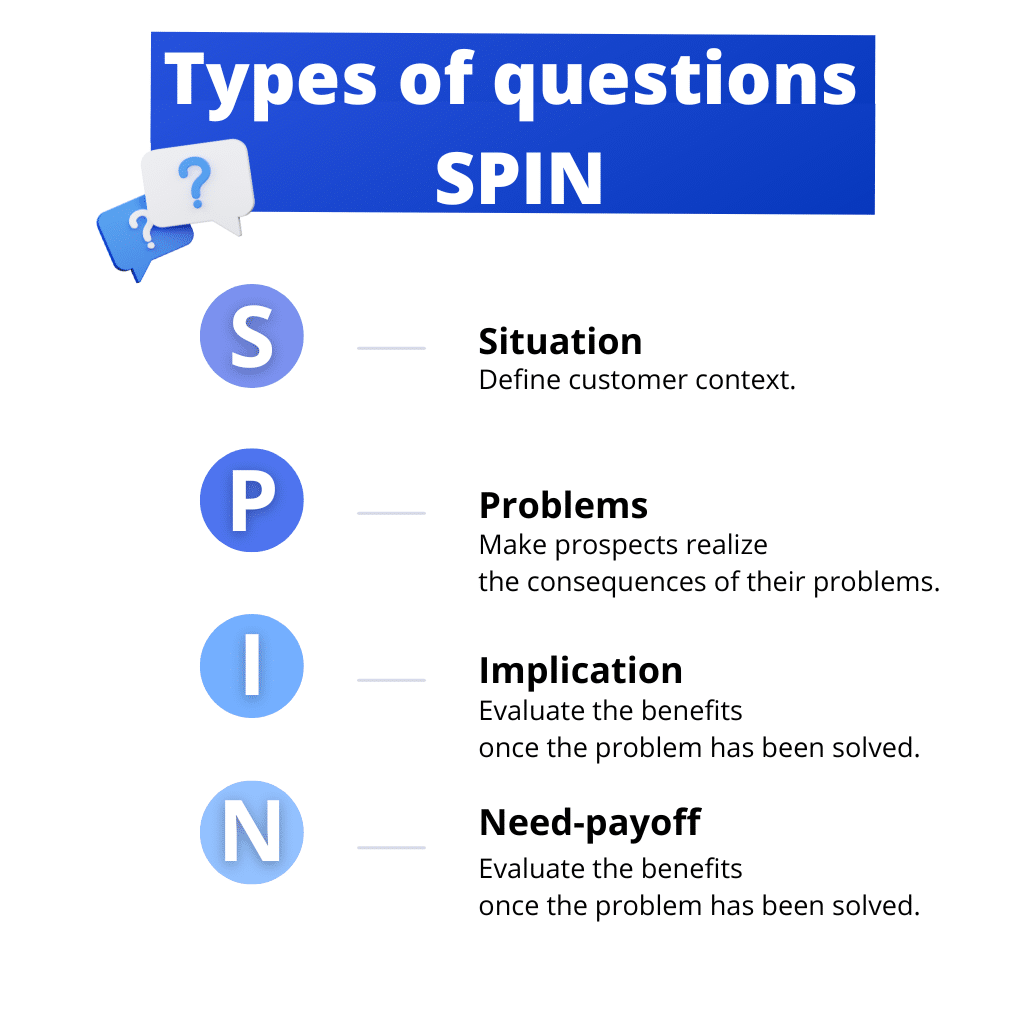
💬 Examples of SPIN questions :
- Situation : “Are you the only decision-maker? “
- Problems : “What are the main challenges you face in your market?”
- Implication : “What impact does your current process have on your service/product?”
- Need-payoff : “What benefits would you see if this problem were solved?”
4. Implement the Challenger Sale Method
Forget simple, conventional sales pitches. The Challenger Sale advocates an educational approach, challenging customers. It’s about adapting your offer to present new opportunities that meet their specific needs. Your proposal must outperform the competition. A clear, substantiated offer, supported by concrete examples, will attract attention and reduce customer resistance. 💡
➡️ To do this, you need to produce a convincing pitch ! Here are the 6 steps to making it a success:
- Introduction: Identify your target’s needs. 🎯
- Reframe: Reveal a little-known difficulty, prompting reconsideration of traditional solutions. This is the moment when salespeople redefine their prospect’s needs. This is a key stage. There are 3 possible scenarios:
- When the customer is unaware of the problem or its solution, reframing involves highlighting the unanticipated problem 🧐
- If the customer identifies his or her problem, but lacks a concrete answer, reframing aims to understand the root causes of the problem and the tools needed to solve it.🔎
- If the customer recognizes his problem and thinks he has an appropriate answer, it is then necessary to show him the aspects he has underestimated. 👀
- Concrete aspect : Present the benefits of your offer with tangible data. 📊
- Emotional impact : Humanize the concern to make it personal. ❤️
- Value proposition : Detail your personalized approach. 💼
- The solution and its implementation : Explain how it works in practice, why it’s simple, intuitive… 🛠️
5. Develop Emotional Intelligence in Sales
Emotional intelligence (EI) is crucial for sales professionals as it enhances their ability to understand, manage, and influence emotions. This skill not only improves interactions with clients but also helps in responding to their needs effectively, there by closing deals more successfully 🤝.
EI is essential in sales for building deep, trusting relationships through understanding and empathizing with customers. It also plays a critical role in resolving conflicts and making thoughtful decisions by managing one’s own emotions 🧠.
➡️ Developing Emotional Sales Intelligence :
- Active Listening : Focus on truly understanding the customer, which helps in responding more effectively 👂.
- Reflection : Analyze your interactions to identify emotional strengths and areas for improvement 🤔.
- Feedback : Seek regular feedback to gain insights into emotional handling and perceptions 📝.
- EI Training : Participate in programs that offer tools and techniques to improve EI components 📚.
- Stress Management : Employ techniques like mindfulness to maintain a calm, clear decision-making state 🧘♂️.
In practice, EI allows sales professionals to adapt their approach to match the emotional state of the customer, providing reassurance when needed, and fostering loyalty by making customers feel valued and understood. Mastering EI can dramatically improve a salesperson‘s effectiveness 🚀.
6. Capture Your Target’s Attention with Storytelling
Storytelling is a potent sales technique that captures the essence of your product or service through engaging narratives 📖. These stories connect emotionally with customers, making your message more memorable and impactful 💡.
Benefits of Storytelling in Sales :
- Emotional Connection : Stories evoke emotions, driving decision-making more effectively than mere facts ❤️.
- Increased Retention : People remember information better when it’s embedded in a story, making complex data more relatable and easier to recall 🧠.
- Trust Building : Stories create a shared experience, fostering trust between the salesperson and the customer 👥.
Create relatable characters and scenarios that mirror the real challenges of your audience, ensuring the story has a clear emotional arc and resolution that underscores the benefits of your solution. Keep your stories authentic and grounded in realistic or actual customer experiences.
Implementing Storytelling in Sales :
- Tailor to the Audience : Modify your stories to better fit the background, industry, or specific interests of your audience. This personalization makes the story more relevant and impactful 🎯.
- Use Visuals : Whenever possible, complement your stories with visuals. This could be through slides, videos, or live demonstrations that enhance the narrative and make the scenarios more vivid 🖼️.
- Practice Delivery : The impact of a story can be greatly enhanced or diminished by how it is told. Practice your delivery to ensure it’s engaging, well-paced, and clear 🗣️.
- Feedback and Refinement : Solicit feedback on your stories from colleagues or trusted customers. Use their insights to refine and improve the effectiveness of your storytelling 🔍.
7. ABM and Inbound selling: Identifying high-potential customers
ABM, or Account Based Marketing, is a marketing tactic that specifically targets key accounts. In this sales method, each prospect is considered a market in its own right. This approach involves close collaboration between the marketing department and the different types of sales force for in-depth knowledge of each targeted decision-maker. 🎯
Among the main challenges of ABM are:
- The need for in-depth knowledge of the people within target companies. 🔍
- The constant updating of data to rely on reliable and complete information. 🔄
- The creation of personalized content. 📝
- Synergy between marketing and sales departments. 💼
✅ Its advantages are:
- Concentration of efforts on strategic accounts, generating customers representing a significant share of sales. 📈
- Ultra-targeted communication to land profitable contracts. 📊
- Offers a personalized, incomparable experience. ✨
Inbound marketing is an approach based on attracting leads with attractive content. This enables you to work with prospects who are already interested, and turn them into loyal customers. Its principles can be summed up in four steps:
- Attract : Fetch visitors to your site or social networks via the creation of relevant content. 🎣
- Convert : Encourage these visitors to perform an action, such as signing up for a newsletter. 💡
- Sell : Help your prospects take the buying step through lead nurturing. 💰
- Loyalize : Satisfy your customers so that they become your best ambassadors. 🌟
During these phases, content creation plays a crucial role in the success of the strategy.
It’s essential to combine Inbound Marketing, ABM and Account based selling to reach the whole spectrum. Inbound marketing generates leads en masse. ABM targets key accounts for a more personalized approach. By combining the two, you can benefit from the advantages of each and create a virtuous circle. 💼
➡️ Examples:
- Use Inbound Marketing to target SMEs and ABM for specific key accounts.
- Combine Inbound Marketing for all your markets and ABM for a specific vertical.
- Integrate ABM to target new markets you haven’t yet explored with Inbound Marketing.
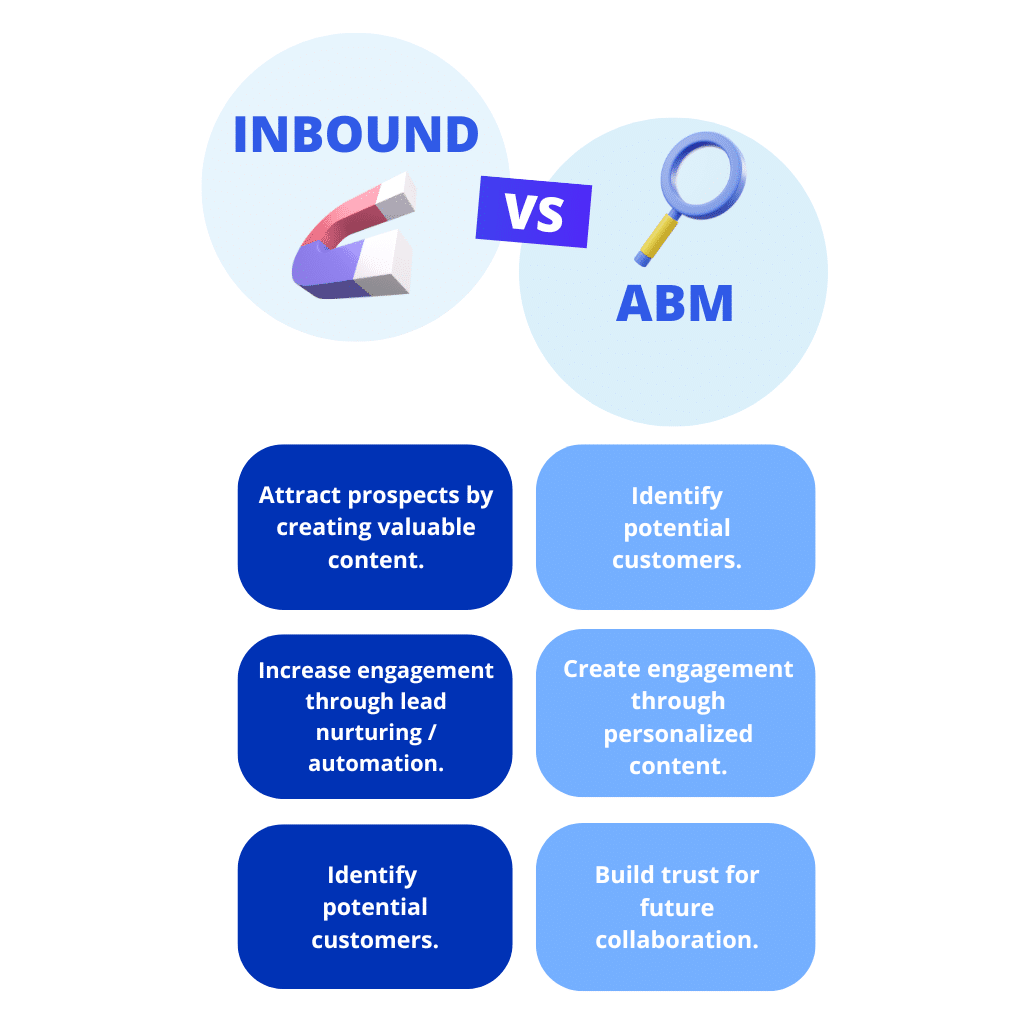
8. Be a Good Listener: The Power of Active Listening in Sales
Active listening is a vital sales skill that goes beyond hearing words; it involves fully engaging with customers to understand their context, emotions, and underlying messages 👂🏽.
🔑 Key Elements of Active Listening :
- Full Attention : Maintaining eye contact and avoiding distractions 👀.
- Empathy : Validating the customer’s feelings to foster a deeper connection ❤️.
- Clarification : Asking questions to ensure understanding and detail ❓.
The benefits of active listening are profound in sales. It enhances the salesperson’s ability to grasp the customer’s needs accurately, builds trust, and reduces the likelihood of miscommunications. Customers who feel heard are more likely to be satisfied and remain loyal to your brand 🤝.
➡️ To find out how to optimize your customer satisfaction, click here !
To effectively practice active listening, sales professionals should clear their minds of preconceptions before conversations, focus solely on understanding the customer’s point of view, use verbal affirmations to show engagement. You need to become an advisor, you can use the consultative selling technique.
9. Building and Maintaining Relationships: A Key Sales Method
Sales strategies should focus on cultivating lasting connections that lead to repeat business and referrals, not just closing individual sales. This involves regular follow-ups, personalized communication, and consistently going the extra mile for your customers, helping you stand out from competitors and build loyalty and trust 🌟.
Benefits of Strong Customer Relationships :
- Increased Customer Retention : Customers who feel valued are more likely to stay loyal ❤️.
- Higher Lifetime Value : Satisfied customers often make repeat purchases and explore additional services 🔄.
- Enhanced Brand Reputation : Positive experiences lead to word-of-mouth referrals, attracting new business 📢.
➡️ Effective relationship-building strategies :

Maintain these relationships with consistent communication and quality service. Respond promptly to inquiries, regularly seek customer feedback to improve services, and adapt to their evolving needs. This strategic approach ensures mutual success and sustained business relationships 💬👥.
10. Implement SNAP Selling
SNAP Selling, is tailored for today’s fast-paced, information-overloaded sales environment where decision-makers are too busy and highly pressured. This sales method is built on four key principles—Keep it Simple, be iNvaluable, always Align, and raise Priorities. Each principle aims to streamline the sales process to make buying decisions easier and faster for customers. It is particularly useful for complex B2B sales.
➡️ Keep it simple :
- Offer fewer options to simplify.
- Present concise, precise content.
➡️ Be invaluable :
- Add value to every interaction.
- Avoid debates and persuasive tactics.
- Offer transparency to your customers.
➡️ Always be consistent :
- Understand buyers’ needs and priorities.
- Align your solution with their objectives.
➡️ Prioritize :
- Keep buyers’ priority needs in mind.
- Tailor your offer and message to their key priorities.
Understanding these basics prepares salespeople to guide buyers through three crucial decisions :
- 🚪 Allow access: Buyers decide whether they want to allow the seller to present their offer.
- 🔄: Move away from the status quo: Buyers assess whether they’re willing to give up their current situation for a better solution.
- 💼 Changing resources: Before committing, buyers check whether the proposed solution meets their needs and represents the best option.
How do you implement these sales techniques?
To implement these sales techniques effectively, it’s essential to follow a structured process and stay committed to it. Here are a few best practices :
Staying alert
Stay on top of new marketing trends, market developments and changing customer needs. The important thing is your target. You need to constantly adjust it in line with new advances in your product/service or changes in the market.
This can be done by :
- Participating in training courses 🤓
- Reading market research 📖
- Setting up a daily watch 👀
- Keeping in touch with your colleagues and mentors 📲
Keep an eye on feedback to identify areas where you can improve your sales technique. 👀
Staying connected
Stay connected to the community of sales professionals by :
- Reading books 📚
- Taking an interest in blogs.🔎
- According to influential people in the field.🙋🏻♀️
Books and blogs can provide practical advice, inspiring case studies and tested strategies for sales success. Participating in online discussion groups or events can also be a great opportunity to learn from others and be inspired. 💬
Track and optimize your performance
You need to keep track of your performance. By analyzing these, you can adjust your sales plans, identify weak areas for improvement and capitalize on your strengths to maximize your success. 📊
To do this, you can use :
- Sales monitoring dashboards 📈
- Customer relationship management software (CRM tools) 💡
- Technical tools. A strategy isn’t just about what you tell your prospect, it’s also about all the elements they’ll be confronted with, such as your website. Paying attention to the technical side of things will help you increase your sales. (example: Google PageSpeed Insights for the speed of your pages)📉
By implementing all these sales techniques and tips, you’ll be able to develop your sales skills, stay at the forefront of best practice and optimize your performance to achieve your goals. 🚀
Frequently asked questions
What role does prospecting play in a sales strategy?
All these methods have one thing in common : prospecting. It’s a fundamental step in any effective sales tactic. It is the starting point for :
- Establish business relationships. 🤝
- Identify opportunities. 👀
- Convert prospects into loyal customers. ❤️
Without effective prospecting, even the best offers can go unrecognized and untapped.
Definition: Prospecting is the commercial process whereby a company seeks out potential customers (known as prospects) in order to turn them into real customers. (source : Journal du net)
Automatic prospecting has revolutionized the sales environment. It involves the use of tools and technologies to identify, target and contact prospects more quickly and efficiently. This approach enables companies to optimize their processes, saving valuable time and resources.
There are dozens of prospecting tools, but Waalaxy stands out for its innovative approach and intuitive platform. Waalaxy offers numerous features for effective prospecting on LinkedIn. Waalaxy enables users to define precise search criteria, automate the sending of personalized messages and effectively track the performance of their campaigns.
Waalaxy’s strengths 💼
- Time savings : By automating tasks, Waalaxy enables users to concentrate on higher value-added activities, such as improving their offer or managing customer relations.
- Customization: Waalaxy lets you choose the sequence that meets your specific needs, write personalized messages by adding variables, attachments …
- Performance tracking and analysis: Waalaxy provides detailed tracking tools, enabling users to measure the effectiveness of their campaigns, identify strengths and weaknesses, and adjust their tactics accordingly.
What are the signs that it’s time to change your sales strategy?
The sales environment is constantly changing, which is why you need to pay attention to certain clues that tell you it’s time to pivot. 💫
➡️ Here is a non-exhaustive list of signs to watch out for:
1. Drop in conversion rates: Your conversion rates have dropped significantly recently, which may indicate that your current approach isn’t working as well as it used to.📉
2. Fewer qualified leads: If you notice a drop in the number of qualified leads entering your sales funnel, it may be time to rethink the way you generate leads.🕵🏻
3. Stagnant sales: Your sales are stagnating or even declining, despite your best efforts. This indicates that you are not succeeding in stimulating sales growth as planned.💰
4. Negative feedback: You receive negative feedback from your current customers about their buying experience, this requires a re-evaluation of your sales approach. 🤔
5. Market evolution: Market trends or customer behavior have changed, making your current sales strategy obsolete or less effective. It’s important to adapt quickly to these changes to stay competitive. You can set up a monitoring system to keep up to date! 📈
6. Competitor performance: Your direct competitors are performing better in terms of sales or market share, which could indicate that they have adopted more effective strategies than yours. You can run a Benchmark to find out more. 👀
7. Unsatisfactory returns on investment: Your sales efforts are not generating the expected returns on investment, requiring a thorough evaluation and possibly adjustments to maximize effectiveness by studying the various metrics at your disposal.📊
What are the differences between traditional sales techniques and new methods?
| Aspect | Traditional sales techniques | New sales methods |
| Approach | Direct | Inbound |
| Main strategies | Persuasion, argumentation, creating urgency | Engaging content, personalization, data analysis |
| Interactions | Mainly in person or by telephone | Multichannel, including social media, emailing … |
| Customer relations | Direct, often by telephone or in person | Automated with the use of CRM software, chatbots … |
| Focus | Convincing the customer to buy | Attract and engage customers with relevant content |
| Metrics studied | Conversion rate, sales generated, number of meetings | Online engagement rate, website conversion rate, number of qualified leads… |
| Benefits | Direct human interaction, ability to read reactions | Customization and efficiency thanks to automation |
| Disadvantages | Can be perceived as intrusive, depending on seller’s expertise | Requires more advanced content creation and data analysis efforts |


